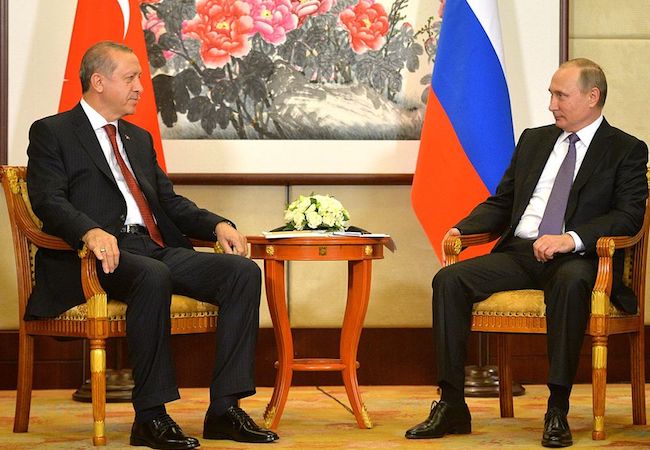
By Damien Dean
A failed coup attempt, unremitting terrorist attacks, military operations, faltering economy, a tumbling currency, constitution change debates, ever-lasting ethnic tensions… No country has experienced a more dizzying and unquiet year in 2016 than Turkey. The year 2016 was perhaps the longest year in the history of the Republic with so much events shaking the axis of the Turkish foreign policy.
The year already started with dim prospects for Turkey. Laden with problems such as the collapse of the Kurdish deal, an ever more unstable Syria, and the refuge crisis, the year 2015 was already scattering a bad omen around that the coming year was not going be a pleasing one.
The country in 2016 suffered probably most from the terror attacks. However, it would have been utterly surprising had the turmoil in Syria not been spilled over the Turkish soil irrespective of Turkey’s involvement in the conflict. The conflict leaked into Turkey: cities had been the target of terrorist attacks claimed by either PKK or ISIS, or groups affiliated to them. The attacks in total left more than 350 hundred dead and thousands of wounded.
Turkey’s ambitions in Syria were stultified by the US’s brazen support to YPG. Since the outset of the crises, the two countries had different visions and priorities. The US time and again found the YPG an effective force to combat against ISIS in the region. Turkey, from the beginning, did not think alike. Already frayed alliance between them has only degenerated in 2016, crystallizing the rift between the two countries. By the end of the year, Mr Erdogan has come to the point to accuse the US-led coalition of supporting all terrorist groups in Syria and Iraq, including YPG and ISIS. His vituperative statements just show how weary Turkey has become in 2016 regarding the unfulfilled promises of the US-led coalitions.
The coup attempt in July 15th, 2016 was yet another litmus test for the Turkey-US relations. Not enough appeasing statements from the US officials regarding the coup attempt and reluctance to extradite Fethullah Gulen marked a nadir in the US-Turkey relations unseen in decades. The US starts the New Year with a new president. Expectations are high in opening a “new era”, in the US-Turkey relations under the Trump administration. But the new era may be fugacious and quickly turn into a horrifying nightmare for Turkey. Mr Donal Trump’s picks Michael T. Flynn, who was panegyric regarding the coup attempt, and Mike Pompeo, who deemed Turkey as an authoritarian Islamist state, have the alchemy to hit Turkey’s high expectations badly.
The coup attempt and its sequel had cataclysmic repercussions not only in relations with the US but also with the European Union (EU). Turkey has attracted the ire of the EU for eroding the level of democracy and freedom. The reinvigorated relations in March, 2016 thanks to the refuge deal, which aimed at lowering the amount of refugee influx into the EU on the condition that visa restrictions for the Turkish citizens be lifted, could not also survived in Turkey’s tumultuous 2016.
The wilting relations with the West and the military coup attempt benefited mostly Russia. The bleak picture in 2015 became an optimistic one in 2016, but not with ease. The irreconcilable differences in Syria between Turkey and Russia had made themselves evident when Turkey shut down a Russian Su-24 fighter-bomber on account of the incursion of the Turkish air space in 2015. The consequences of the dissention with Russia in Syria were devastating so much so that the Turkish economy suffered, rather extremely badly, as a result of embargos put by infuriated Putin. Tourist charter flights were stopped; the number of Russian tourists visiting Turkey dropped by 87%, Turkey’s exports to Russia by 60.5%.

Fences were partly mended when Mr Erdogan visited St. Petersburg in August 2016. The aborted coup had the function of catalyser for improving the ties. Mr Erdogan convinced his Russian counterpart that the jet was downed by the soldiers who are FETO members. Likewise, the assassination of Andrey Karlov, the Russian Ambassador to Turkey, by a Turkish police officer in Ankara did not stir the expected mayhem as the assassin was a FETO member whose aim was to destabilize the Russian-Turkish relations. After ups and downs over a year, Turkey and Russia along with Iran have become spearheads to shape the future of Syria by the end of 2016. Despite the differences in Syria, Turkey and Russia will be ardent for fostering their cordial relations in 2017.
The resignation of Ahmet Davutoglu, the champion of Strategic Depth doctrine, brought a fresh foreign policy orientation for Turkey: “increasing the number of friends and decreasing the number of enemies.” As part of this shift in foreign policy, Prime Minister Binali Yıldırım initiated a rapprochement between Turkey and Israel after six-year long standoff over the Mavi Marmara flotilla incident. Yes, the reconciliation has lessened Turkey’s precious loneliness in the Middle East, but a full-fledged normalization seems very unlikely.
To the surprise of many, Iran was one of the first countries that reached out Mr Erdogan after the putsch. Iran knew well that instability in Turkey would have far-reaching effects in the region had the coup succeeded. Also, the first step for a political solution in Syria with Russia-Turkey-Iran trio reached in the last days of the year might weaken the pure power politics between Turkey and Russia in 2017.
The Republic’s longest year is now behind. But it is hardly over. 2017 is coming with harder challenges for Turkey. Preparing a road map for the country in 2017 will be an arduous task as the axis of Turkish foreign policy is gyrating fast.




